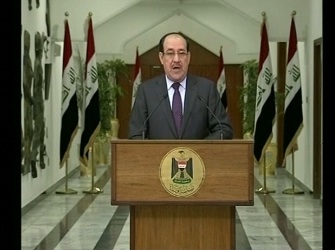 (Reuters) – Iraq’s Prime Minister Nuri al-Maliki said on Wednesday that he hoped to overcome the challenges blocking the formation of a new government, a day after the new parliament’s first session ended without agreement on top government posts.
(Reuters) – Iraq’s Prime Minister Nuri al-Maliki said on Wednesday that he hoped to overcome the challenges blocking the formation of a new government, a day after the new parliament’s first session ended without agreement on top government posts.
“A state of weakness occurred but God willing in the next session (planned for next Tuesday) we will overcome it with cooperation and agreement and openness …in choosing the individuals and the mechanisms that will result in a political process based on…democratic mechanisms,” said Maliki in his weekly televised address.
Sunnis and Kurds abandoned the first meeting of the new parliament after Shi’ites failed to nominate a candidate for prime minister. The Shi’ite parties are deadlocked over Maliki’s ambitions for a third term, and who would replace him.
The new parliament adjourned Tuesday, with plans to meet one week later, if an agreement on posts was reached.
Maliki also offered an amnesty to tribes who fought the government, but excluded those who had “killed and shed blood.”
The United States, United Nations, Iran and Iraq’s own Shi’ite clergy have pushed hard for politicians to come up with an inclusive government to save the country after Sunni insurgents seized large stretches of territory north and west of Baghdad.







